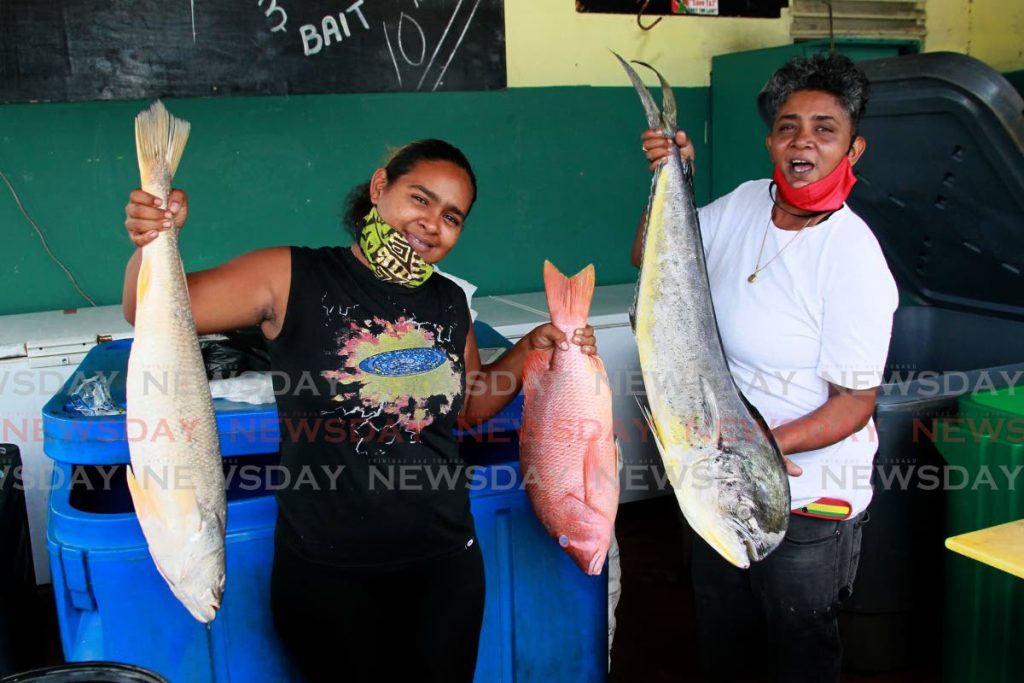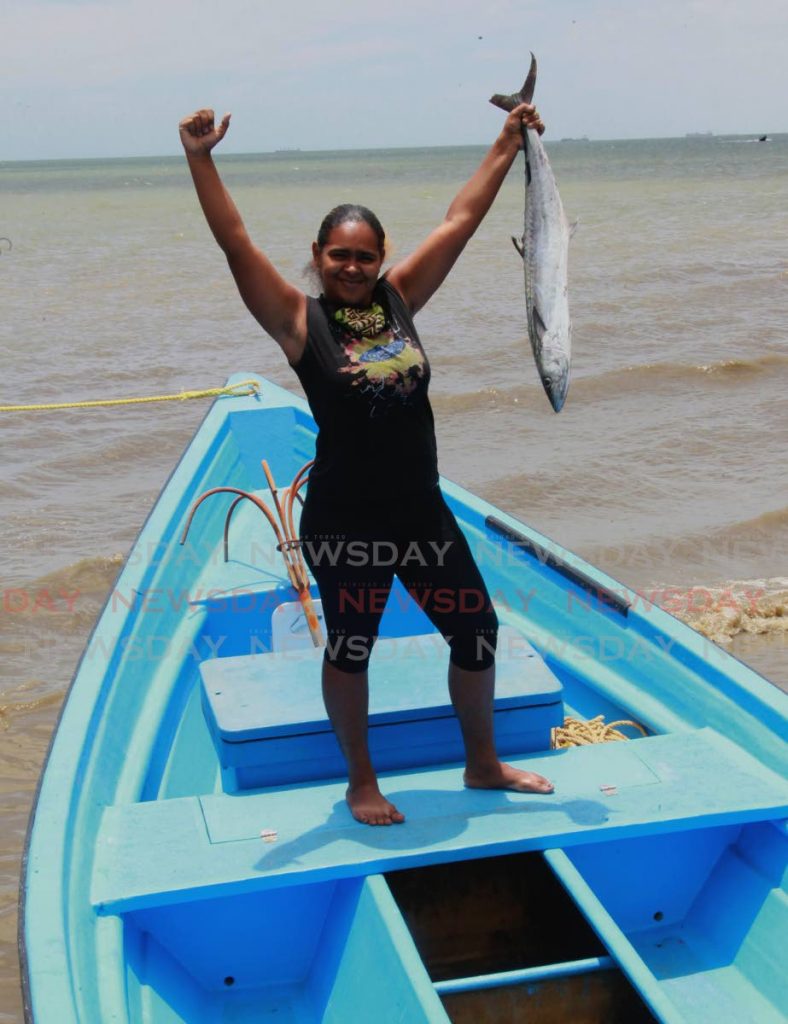St James fisherwomen make 'big catch' in volatile industry

Mariella Alleng, 20, is not like most women.
She isn't interested in what you'd think would interest a typical 20-year-old woman in TT. She's not a fan of makeup; she isn’t particularly interested in hairstyles or making TikTok videos or cell phones: and she doesn’t really like to go out to parties or gatherings.
And while many of her former Corpus Christi College classmates have careers in offices, her true love is the sea. Mariella Alleng is a fisherwoman.
Alleng spoke to Business Day at her family business place at the St James Fishing Depot on Audrey Jeffers Highway. She said she came from a family of fishers, that includes her mother, Juliet Joseph, and her father, Dennis.
Alleng is one of the few women who fish in local waters, which has its challenges, but her passion outweighs the drawbacks which come with the volatile and under-regulated sector.
She and her mother are doing their part to keep the small boat fishing industry afloat.
“I am proud of what I do,” Alleng said. “I don’t study friends, because they try to bring you down for the things you do. They would rather be on a phone.
"But since I was a schoolgirl I would come down here after school and learn from my mother. That is how I learned this business.”
A family sea-business
Joseph, 46, has been fishing all her life and has run a fish retail business since before Alleng was born. Dennis, in his mid-50s, has also fished since he was a boy. The eldest of four children, Alleng was out at sea from as early as two months old. Before she was ten she was already going on fishing expeditions with her parents.
She began learning to drive a boat after she and her father got into an accident in the water when she was just eight. On that day they were in the water near the TT Yacht Club, Glencoe, having just returned from dropping off a group of people down the islands.

“My father had an ailment from young where he tends to fall asleep. It so happened that it took him over that day while we were in the water.”
The tide was low and there were sandbars in the water near the Yacht Club. Their boat crashed into one and ran aground. Some men who were working on the shore nearby pushed the boat back into the water and Alleng’s father was able to sail toward their dock in St James.
When he could go no further, Alleng dived into the water, swam ashore and alerted her mother, who called an ambulance. Her father suffered a dislocated shoulder and knee.
“Since then my father stopped driving the boats, and they taught me,” she said.
Then Alleng began learning about fishing. Her mother’s boat, Victory, was mostly used for net fishing. They would leave the St James Fishing Depot in the afternoon and venture out to sea, not returning to port until 3 am.
As the family mostly practised net fishing, Alleng learned how to repair nets, sail, cast nets and bring in the fish.
She said she enjoyed learning the trade, and the fact that she was able to succeed in a male-dominated industry made her proud.
“It shows me that I could do things that the males can do. Especially fixing nets and gears and holding fish. Those things make you proud that you could do it too.
"The men are proud of us as well, that we could pick up this trade that they have, just by looking and observing and picking it up. They are proud of us. They could big us up in a way, because there are women around that are doing what they are doing.”
Joseph is now teaching her the business aspects of the industry, which include cutting and cleaning fish, wholesaling and retailing it, and most of all, customer service.
'No woman on man boat'
There were a few men who disapproved of the women's presence at the fishing depot, and in the industry on the whole. Alleng says she and her mother both ignore those people.
“We would go out to sea and you would find some people would not want us to go,” Alleng said. “We may be doing something better, or they would want to go, but they aren’t getting to go because of us. That is where the envy and fight- down would come in. Right now, there is a lot of that going around.”
Joseph told Business Day it has been the same since she was a young woman learning the trade. She said many fishermen, whether because of superstition or prejudice, are reluctant to carry women out to sea with them, let alone allow them to fish.
“There are several reasons. Some say because women are accustomed to naming their vessels after males and men name their boats after females, they don’t want you on 'they ting.' Because a woman can’t stoop over the side and relieve themselves and it would make them uncomfortable on their boats, they don’t want you on 'they ting.'

“There are all kinds of reasons. But most times it is just because they don’t like to do it.”
Joseph, who would frequently run away from her Cocorite home to go to the foreshore and fish, said the only reason she got an opportunity to learn fishing as a trade was because many of the fishermen were “tracking” her when she was young.
“They didn’t get through,” she said. “But because I learned quickly and I was doing the right thing, they kept bringing me on and showing me.”
Joseph said it is a rare occasion to see a woman on a boat in a bra-top and boxer shorts pulling in fish, but they are not the only fisherwomen in TT’s waters. She recalled a woman who fished in the waters near Las Cuevas.
“We would anchor our boats close together and fish.”
Alleng said there is a need for more women in the industry, regardless of the feelings of some fishermen. But they would need to start from an early age, which may be a problem, in her opinion.
“I am a young woman too, but my mind is set differently,” Alleng said. “If you try to bring them in, they would find that it is too hard and they can’t learn things. My brother, for example, is 16. He grew up with fishing as well, but all of a sudden he stopped liking it. He would rather be on his phone. Phones have a lot of young people going astray from having their career and have something that they could enjoy.”
Fish industry is sinking
The fact that there is not enough young people in the industry poses a problem for its future, Alleng said the tradition and the trades behind fishing are slowly dying, and new blood is definitely needed.
Joseph added that there are very few interested in learning the trade.
“Long time ago, people used to run away from their home to come here to learn to fish. You know how much licks I get for that? Whole day we by the seaside.
“Now you don't see that anymore. All the interest is lost in those things. Plus most of the fishermen have girl children now, and they don’t want their girls in this industry.”
Fishermen also don’t have the patience to teach someone about fishing, Joseph said.
“It is something that you learn from young, so you could get the nourishment from it. You enjoy it also. For someone to get in there and learn from scratch, a lot of fishermen don’t have the patience to teach them.”
The lack of interest is not limited to fishermen. Alleng and Joseph also observed that, while there was more traffic for the Lent season, younger people were less inclined to follow the tradition of buying fish to eat on Good Friday.
The lack of interest joins with crime, changes in weather patterns, the destruction of ocean beds by shrimp trawlers and competition from larger boats, as some of the major issues facing the industry.
Alleng said during Lent people in the fishing industry have to be particularly vigilant, as criminals who realise they would be making more money for the season would take any opportunity to pounce and relieve them of their hard-earned cash.
Theft is not limited to cash, either. Joseph and Alleng complained that for months they were not able to put their boat out into the water because of criminal activities.
“Our boat was among five that were stolen six months ago,” Joseph said. “I got mine back, without the engine, in South Oropouche. Some months ago they got back the boats, but all the engines were gone."
A boat engine could cost as much as $50,000 or more.
“Another fisherman lost his engine and he just bought one back, and they stole it again. That man is a permanent fisherman and he has no other means of surviving but fishing. And this is the fourth time they did that to him.
"Up to now I haven't gotten back an engine.”
The risks do not end at the docks. At sea, they have to worry about bandits, pirates and kidnappers.
“There are certain places where fishermen used to go out to fish that they can’t go any more,” Alleng said, “Like in the 'savannah' near the Venezuelan border. My mother used to go there to fish all the time, but it is now off limits.”
She said with the increase in Venezuelan immigrants trying to make their way to TT by boat, there is now a higher presence of Coast Guard boats patrolling the waters, but even they cannot be everywhere at once.
Alleng and her mother now concentrate on the wholesale/retail business at the fishing depot. Joseph goes early in the morning and buys fish wholesale, while Alleng helps with cleaning and sales later in the day as she continues to learn.
A fisherwoman’s legacy
Despite the many challenges, Alleng can see herself not only taking over the family business, but teaching others, both men and women, to fish.
“I see myself doing exactly what I am doing now, by the grace of God,” she said. “My cousin who is 18, when she comes down for the weekend, she would be with us all the time and she began picking up the trade.
“Sometimes if she gets a small fish she would try to scale and cut and gut it. She may not get it perfect, but it still makes me proud that she is trying to do something with her time.”
Alleng also spoke of her youngest brother, who also took a liking to the fishing trade. She said in several ways, he is doing better than she is, with tying knots and repairing nets.
“My little brother, Sebastian is ten. He really loves fishing. He knows how to tie a line better than I, and I am doing it for years. Some things I taught him and now he knows how to do it better than I do."
Like her mother, Alleng hopes to get her own boat in the future. She said she would name it after her two-year-old daughter, Emma. Like Alleng, Emma too will have a mother and father who make a living in the fishing industry.
“Her father is a fisherman, I am a fisherwoman. She really likes the water and she likes fish. So I see no problem in teaching her what I know. That way, the legacy could go on.”

Comments
"St James fisherwomen make ‘big catch’ in volatile industry"